Entrepreneurship: Types, Impacts, and Contributions in the UK Economy after Brexit
VerifiedAdded on 2023/04/04
|13
|3932
|265
AI Summary
This research report discusses the opportunities and barriers for entrepreneurs in the UK, the different types of entrepreneurial ventures and their relationships, the impacts of small and micro businesses on the UK economy after Brexit, and the skills and traits of successful entrepreneurs. It also explores the effects of background and experience on entrepreneurship. The report highlights the contributions of SMEs in driving economic growth and creating employment opportunities.
Contribute Materials
Your contribution can guide someone’s learning journey. Share your
documents today.

ENTREPRENEURSHIP
1 | P a g e
1 | P a g e
Secure Best Marks with AI Grader
Need help grading? Try our AI Grader for instant feedback on your assignments.
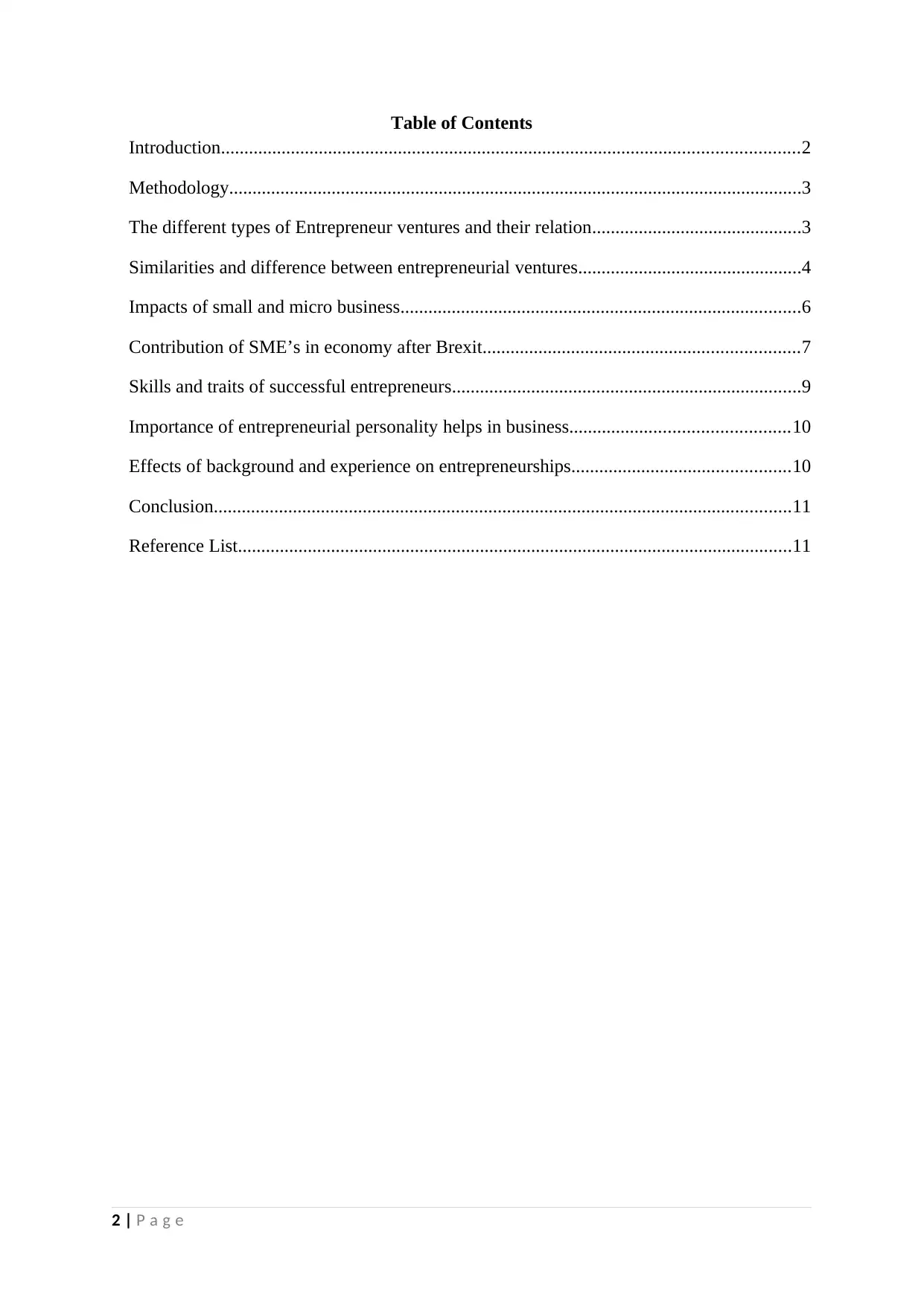
Table of Contents
Introduction............................................................................................................................2
Methodology...........................................................................................................................3
The different types of Entrepreneur ventures and their relation.............................................3
Similarities and difference between entrepreneurial ventures................................................4
Impacts of small and micro business......................................................................................6
Contribution of SME’s in economy after Brexit....................................................................7
Skills and traits of successful entrepreneurs...........................................................................9
Importance of entrepreneurial personality helps in business...............................................10
Effects of background and experience on entrepreneurships...............................................10
Conclusion............................................................................................................................11
Reference List.......................................................................................................................11
2 | P a g e
Introduction............................................................................................................................2
Methodology...........................................................................................................................3
The different types of Entrepreneur ventures and their relation.............................................3
Similarities and difference between entrepreneurial ventures................................................4
Impacts of small and micro business......................................................................................6
Contribution of SME’s in economy after Brexit....................................................................7
Skills and traits of successful entrepreneurs...........................................................................9
Importance of entrepreneurial personality helps in business...............................................10
Effects of background and experience on entrepreneurships...............................................10
Conclusion............................................................................................................................11
Reference List.......................................................................................................................11
2 | P a g e
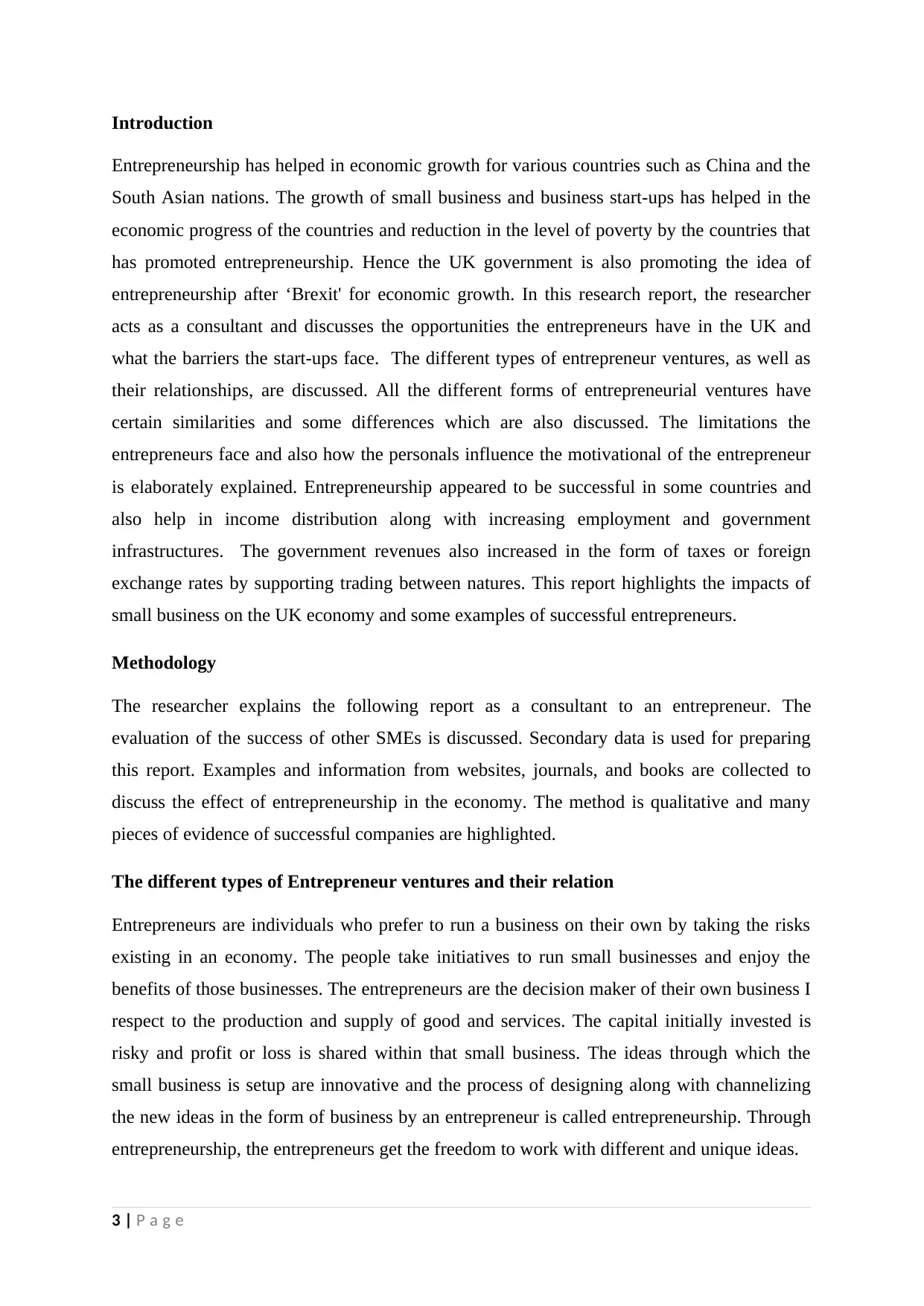
Introduction
Entrepreneurship has helped in economic growth for various countries such as China and the
South Asian nations. The growth of small business and business start-ups has helped in the
economic progress of the countries and reduction in the level of poverty by the countries that
has promoted entrepreneurship. Hence the UK government is also promoting the idea of
entrepreneurship after ‘Brexit' for economic growth. In this research report, the researcher
acts as a consultant and discusses the opportunities the entrepreneurs have in the UK and
what the barriers the start-ups face. The different types of entrepreneur ventures, as well as
their relationships, are discussed. All the different forms of entrepreneurial ventures have
certain similarities and some differences which are also discussed. The limitations the
entrepreneurs face and also how the personals influence the motivational of the entrepreneur
is elaborately explained. Entrepreneurship appeared to be successful in some countries and
also help in income distribution along with increasing employment and government
infrastructures. The government revenues also increased in the form of taxes or foreign
exchange rates by supporting trading between natures. This report highlights the impacts of
small business on the UK economy and some examples of successful entrepreneurs.
Methodology
The researcher explains the following report as a consultant to an entrepreneur. The
evaluation of the success of other SMEs is discussed. Secondary data is used for preparing
this report. Examples and information from websites, journals, and books are collected to
discuss the effect of entrepreneurship in the economy. The method is qualitative and many
pieces of evidence of successful companies are highlighted.
The different types of Entrepreneur ventures and their relation
Entrepreneurs are individuals who prefer to run a business on their own by taking the risks
existing in an economy. The people take initiatives to run small businesses and enjoy the
benefits of those businesses. The entrepreneurs are the decision maker of their own business I
respect to the production and supply of good and services. The capital initially invested is
risky and profit or loss is shared within that small business. The ideas through which the
small business is setup are innovative and the process of designing along with channelizing
the new ideas in the form of business by an entrepreneur is called entrepreneurship. Through
entrepreneurship, the entrepreneurs get the freedom to work with different and unique ideas.
3 | P a g e
Entrepreneurship has helped in economic growth for various countries such as China and the
South Asian nations. The growth of small business and business start-ups has helped in the
economic progress of the countries and reduction in the level of poverty by the countries that
has promoted entrepreneurship. Hence the UK government is also promoting the idea of
entrepreneurship after ‘Brexit' for economic growth. In this research report, the researcher
acts as a consultant and discusses the opportunities the entrepreneurs have in the UK and
what the barriers the start-ups face. The different types of entrepreneur ventures, as well as
their relationships, are discussed. All the different forms of entrepreneurial ventures have
certain similarities and some differences which are also discussed. The limitations the
entrepreneurs face and also how the personals influence the motivational of the entrepreneur
is elaborately explained. Entrepreneurship appeared to be successful in some countries and
also help in income distribution along with increasing employment and government
infrastructures. The government revenues also increased in the form of taxes or foreign
exchange rates by supporting trading between natures. This report highlights the impacts of
small business on the UK economy and some examples of successful entrepreneurs.
Methodology
The researcher explains the following report as a consultant to an entrepreneur. The
evaluation of the success of other SMEs is discussed. Secondary data is used for preparing
this report. Examples and information from websites, journals, and books are collected to
discuss the effect of entrepreneurship in the economy. The method is qualitative and many
pieces of evidence of successful companies are highlighted.
The different types of Entrepreneur ventures and their relation
Entrepreneurs are individuals who prefer to run a business on their own by taking the risks
existing in an economy. The people take initiatives to run small businesses and enjoy the
benefits of those businesses. The entrepreneurs are the decision maker of their own business I
respect to the production and supply of good and services. The capital initially invested is
risky and profit or loss is shared within that small business. The ideas through which the
small business is setup are innovative and the process of designing along with channelizing
the new ideas in the form of business by an entrepreneur is called entrepreneurship. Through
entrepreneurship, the entrepreneurs get the freedom to work with different and unique ideas.
3 | P a g e
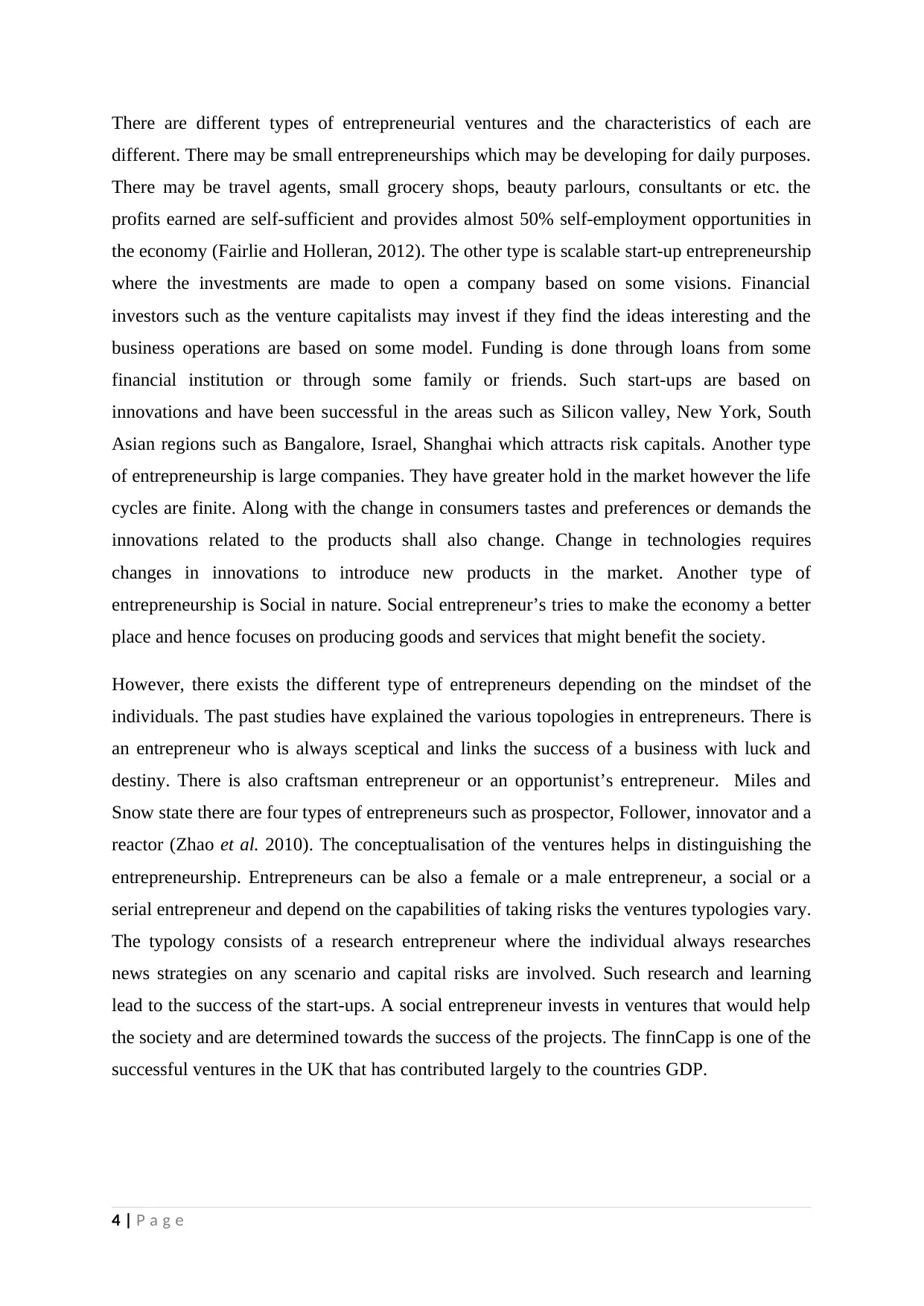
There are different types of entrepreneurial ventures and the characteristics of each are
different. There may be small entrepreneurships which may be developing for daily purposes.
There may be travel agents, small grocery shops, beauty parlours, consultants or etc. the
profits earned are self-sufficient and provides almost 50% self-employment opportunities in
the economy (Fairlie and Holleran, 2012). The other type is scalable start-up entrepreneurship
where the investments are made to open a company based on some visions. Financial
investors such as the venture capitalists may invest if they find the ideas interesting and the
business operations are based on some model. Funding is done through loans from some
financial institution or through some family or friends. Such start-ups are based on
innovations and have been successful in the areas such as Silicon valley, New York, South
Asian regions such as Bangalore, Israel, Shanghai which attracts risk capitals. Another type
of entrepreneurship is large companies. They have greater hold in the market however the life
cycles are finite. Along with the change in consumers tastes and preferences or demands the
innovations related to the products shall also change. Change in technologies requires
changes in innovations to introduce new products in the market. Another type of
entrepreneurship is Social in nature. Social entrepreneur’s tries to make the economy a better
place and hence focuses on producing goods and services that might benefit the society.
However, there exists the different type of entrepreneurs depending on the mindset of the
individuals. The past studies have explained the various topologies in entrepreneurs. There is
an entrepreneur who is always sceptical and links the success of a business with luck and
destiny. There is also craftsman entrepreneur or an opportunist’s entrepreneur. Miles and
Snow state there are four types of entrepreneurs such as prospector, Follower, innovator and a
reactor (Zhao et al. 2010). The conceptualisation of the ventures helps in distinguishing the
entrepreneurship. Entrepreneurs can be also a female or a male entrepreneur, a social or a
serial entrepreneur and depend on the capabilities of taking risks the ventures typologies vary.
The typology consists of a research entrepreneur where the individual always researches
news strategies on any scenario and capital risks are involved. Such research and learning
lead to the success of the start-ups. A social entrepreneur invests in ventures that would help
the society and are determined towards the success of the projects. The finnCapp is one of the
successful ventures in the UK that has contributed largely to the countries GDP.
4 | P a g e
different. There may be small entrepreneurships which may be developing for daily purposes.
There may be travel agents, small grocery shops, beauty parlours, consultants or etc. the
profits earned are self-sufficient and provides almost 50% self-employment opportunities in
the economy (Fairlie and Holleran, 2012). The other type is scalable start-up entrepreneurship
where the investments are made to open a company based on some visions. Financial
investors such as the venture capitalists may invest if they find the ideas interesting and the
business operations are based on some model. Funding is done through loans from some
financial institution or through some family or friends. Such start-ups are based on
innovations and have been successful in the areas such as Silicon valley, New York, South
Asian regions such as Bangalore, Israel, Shanghai which attracts risk capitals. Another type
of entrepreneurship is large companies. They have greater hold in the market however the life
cycles are finite. Along with the change in consumers tastes and preferences or demands the
innovations related to the products shall also change. Change in technologies requires
changes in innovations to introduce new products in the market. Another type of
entrepreneurship is Social in nature. Social entrepreneur’s tries to make the economy a better
place and hence focuses on producing goods and services that might benefit the society.
However, there exists the different type of entrepreneurs depending on the mindset of the
individuals. The past studies have explained the various topologies in entrepreneurs. There is
an entrepreneur who is always sceptical and links the success of a business with luck and
destiny. There is also craftsman entrepreneur or an opportunist’s entrepreneur. Miles and
Snow state there are four types of entrepreneurs such as prospector, Follower, innovator and a
reactor (Zhao et al. 2010). The conceptualisation of the ventures helps in distinguishing the
entrepreneurship. Entrepreneurs can be also a female or a male entrepreneur, a social or a
serial entrepreneur and depend on the capabilities of taking risks the ventures typologies vary.
The typology consists of a research entrepreneur where the individual always researches
news strategies on any scenario and capital risks are involved. Such research and learning
lead to the success of the start-ups. A social entrepreneur invests in ventures that would help
the society and are determined towards the success of the projects. The finnCapp is one of the
successful ventures in the UK that has contributed largely to the countries GDP.
4 | P a g e
Secure Best Marks with AI Grader
Need help grading? Try our AI Grader for instant feedback on your assignments.
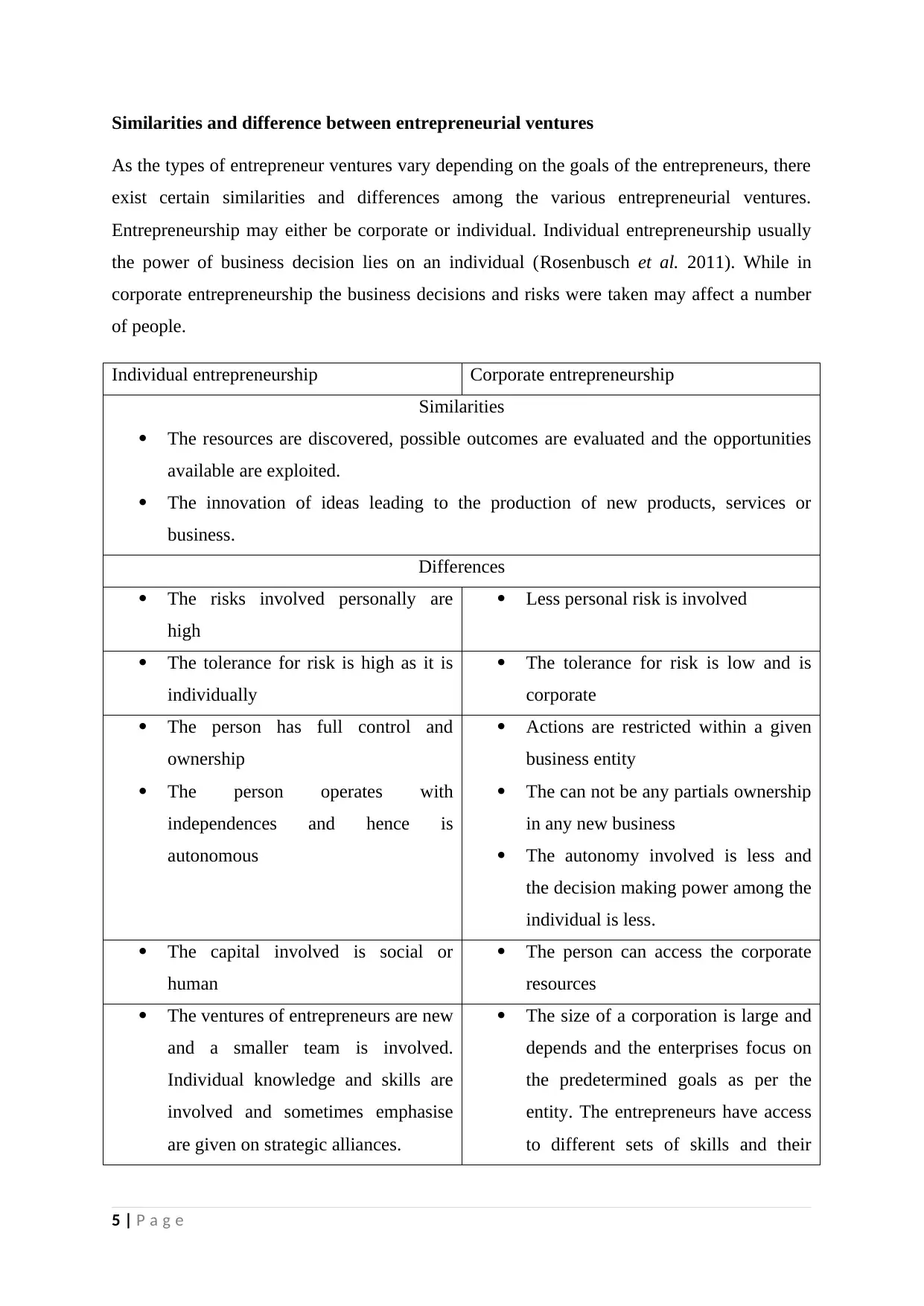
Similarities and difference between entrepreneurial ventures
As the types of entrepreneur ventures vary depending on the goals of the entrepreneurs, there
exist certain similarities and differences among the various entrepreneurial ventures.
Entrepreneurship may either be corporate or individual. Individual entrepreneurship usually
the power of business decision lies on an individual (Rosenbusch et al. 2011). While in
corporate entrepreneurship the business decisions and risks were taken may affect a number
of people.
Individual entrepreneurship Corporate entrepreneurship
Similarities
The resources are discovered, possible outcomes are evaluated and the opportunities
available are exploited.
The innovation of ideas leading to the production of new products, services or
business.
Differences
The risks involved personally are
high
Less personal risk is involved
The tolerance for risk is high as it is
individually
The tolerance for risk is low and is
corporate
The person has full control and
ownership
The person operates with
independences and hence is
autonomous
Actions are restricted within a given
business entity
The can not be any partials ownership
in any new business
The autonomy involved is less and
the decision making power among the
individual is less.
The capital involved is social or
human
The person can access the corporate
resources
The ventures of entrepreneurs are new
and a smaller team is involved.
Individual knowledge and skills are
involved and sometimes emphasise
are given on strategic alliances.
The size of a corporation is large and
depends and the enterprises focus on
the predetermined goals as per the
entity. The entrepreneurs have access
to different sets of skills and their
5 | P a g e
As the types of entrepreneur ventures vary depending on the goals of the entrepreneurs, there
exist certain similarities and differences among the various entrepreneurial ventures.
Entrepreneurship may either be corporate or individual. Individual entrepreneurship usually
the power of business decision lies on an individual (Rosenbusch et al. 2011). While in
corporate entrepreneurship the business decisions and risks were taken may affect a number
of people.
Individual entrepreneurship Corporate entrepreneurship
Similarities
The resources are discovered, possible outcomes are evaluated and the opportunities
available are exploited.
The innovation of ideas leading to the production of new products, services or
business.
Differences
The risks involved personally are
high
Less personal risk is involved
The tolerance for risk is high as it is
individually
The tolerance for risk is low and is
corporate
The person has full control and
ownership
The person operates with
independences and hence is
autonomous
Actions are restricted within a given
business entity
The can not be any partials ownership
in any new business
The autonomy involved is less and
the decision making power among the
individual is less.
The capital involved is social or
human
The person can access the corporate
resources
The ventures of entrepreneurs are new
and a smaller team is involved.
Individual knowledge and skills are
involved and sometimes emphasise
are given on strategic alliances.
The size of a corporation is large and
depends and the enterprises focus on
the predetermined goals as per the
entity. The entrepreneurs have access
to different sets of skills and their
5 | P a g e
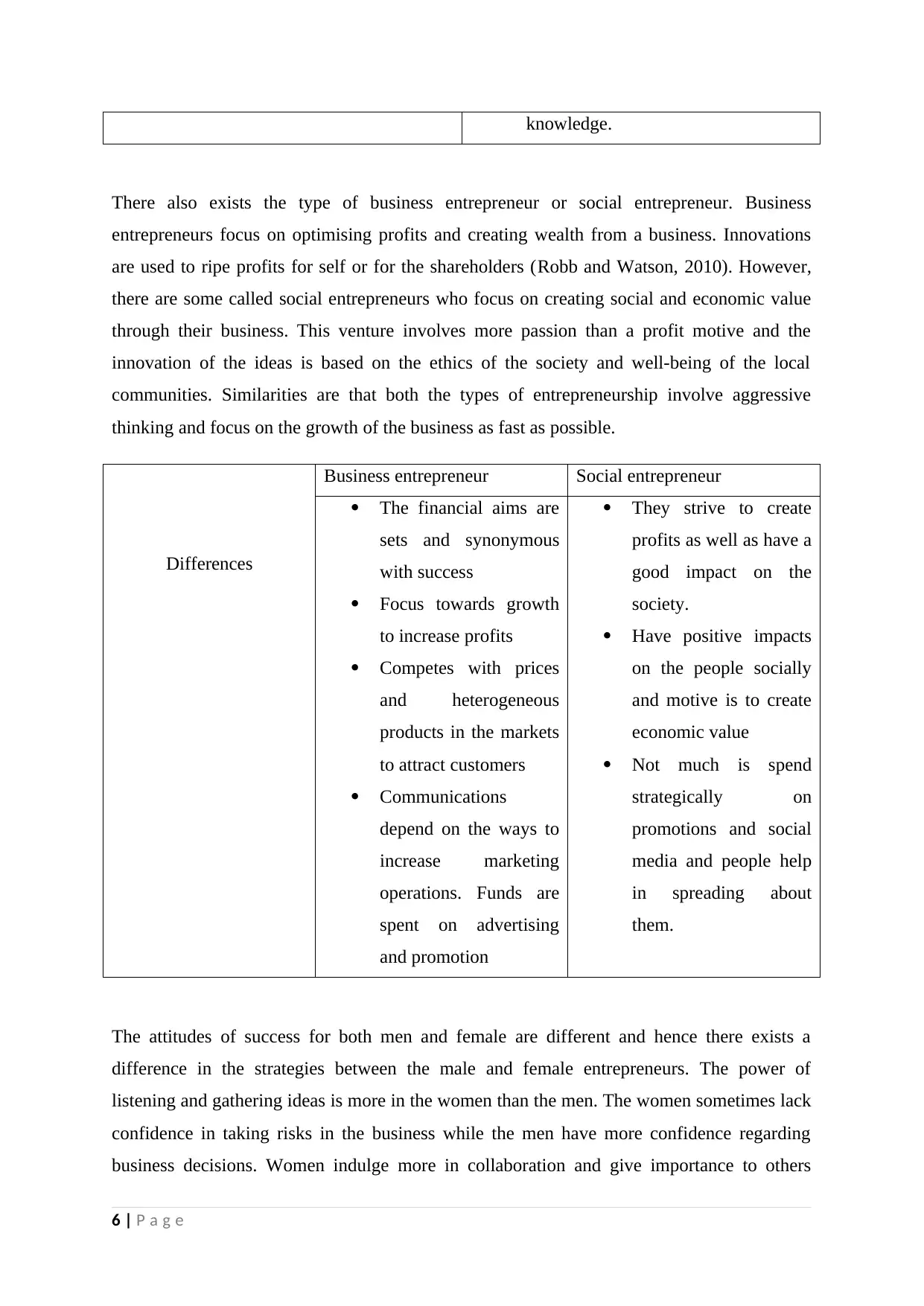
knowledge.
There also exists the type of business entrepreneur or social entrepreneur. Business
entrepreneurs focus on optimising profits and creating wealth from a business. Innovations
are used to ripe profits for self or for the shareholders (Robb and Watson, 2010). However,
there are some called social entrepreneurs who focus on creating social and economic value
through their business. This venture involves more passion than a profit motive and the
innovation of the ideas is based on the ethics of the society and well-being of the local
communities. Similarities are that both the types of entrepreneurship involve aggressive
thinking and focus on the growth of the business as fast as possible.
Differences
Business entrepreneur Social entrepreneur
The financial aims are
sets and synonymous
with success
Focus towards growth
to increase profits
Competes with prices
and heterogeneous
products in the markets
to attract customers
Communications
depend on the ways to
increase marketing
operations. Funds are
spent on advertising
and promotion
They strive to create
profits as well as have a
good impact on the
society.
Have positive impacts
on the people socially
and motive is to create
economic value
Not much is spend
strategically on
promotions and social
media and people help
in spreading about
them.
The attitudes of success for both men and female are different and hence there exists a
difference in the strategies between the male and female entrepreneurs. The power of
listening and gathering ideas is more in the women than the men. The women sometimes lack
confidence in taking risks in the business while the men have more confidence regarding
business decisions. Women indulge more in collaboration and give importance to others
6 | P a g e
There also exists the type of business entrepreneur or social entrepreneur. Business
entrepreneurs focus on optimising profits and creating wealth from a business. Innovations
are used to ripe profits for self or for the shareholders (Robb and Watson, 2010). However,
there are some called social entrepreneurs who focus on creating social and economic value
through their business. This venture involves more passion than a profit motive and the
innovation of the ideas is based on the ethics of the society and well-being of the local
communities. Similarities are that both the types of entrepreneurship involve aggressive
thinking and focus on the growth of the business as fast as possible.
Differences
Business entrepreneur Social entrepreneur
The financial aims are
sets and synonymous
with success
Focus towards growth
to increase profits
Competes with prices
and heterogeneous
products in the markets
to attract customers
Communications
depend on the ways to
increase marketing
operations. Funds are
spent on advertising
and promotion
They strive to create
profits as well as have a
good impact on the
society.
Have positive impacts
on the people socially
and motive is to create
economic value
Not much is spend
strategically on
promotions and social
media and people help
in spreading about
them.
The attitudes of success for both men and female are different and hence there exists a
difference in the strategies between the male and female entrepreneurs. The power of
listening and gathering ideas is more in the women than the men. The women sometimes lack
confidence in taking risks in the business while the men have more confidence regarding
business decisions. Women indulge more in collaboration and give importance to others
6 | P a g e
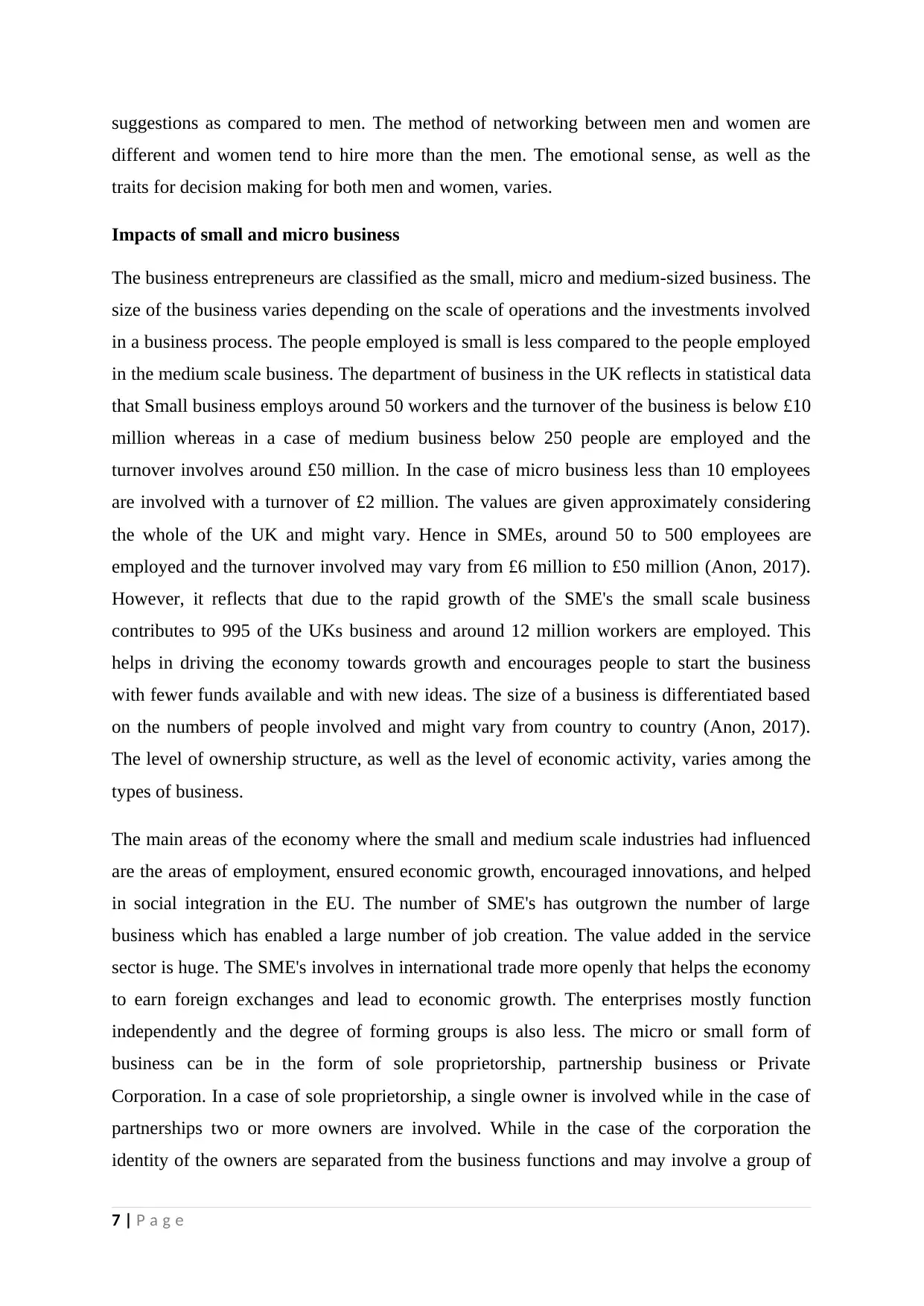
suggestions as compared to men. The method of networking between men and women are
different and women tend to hire more than the men. The emotional sense, as well as the
traits for decision making for both men and women, varies.
Impacts of small and micro business
The business entrepreneurs are classified as the small, micro and medium-sized business. The
size of the business varies depending on the scale of operations and the investments involved
in a business process. The people employed is small is less compared to the people employed
in the medium scale business. The department of business in the UK reflects in statistical data
that Small business employs around 50 workers and the turnover of the business is below £10
million whereas in a case of medium business below 250 people are employed and the
turnover involves around £50 million. In the case of micro business less than 10 employees
are involved with a turnover of £2 million. The values are given approximately considering
the whole of the UK and might vary. Hence in SMEs, around 50 to 500 employees are
employed and the turnover involved may vary from £6 million to £50 million (Anon, 2017).
However, it reflects that due to the rapid growth of the SME's the small scale business
contributes to 995 of the UKs business and around 12 million workers are employed. This
helps in driving the economy towards growth and encourages people to start the business
with fewer funds available and with new ideas. The size of a business is differentiated based
on the numbers of people involved and might vary from country to country (Anon, 2017).
The level of ownership structure, as well as the level of economic activity, varies among the
types of business.
The main areas of the economy where the small and medium scale industries had influenced
are the areas of employment, ensured economic growth, encouraged innovations, and helped
in social integration in the EU. The number of SME's has outgrown the number of large
business which has enabled a large number of job creation. The value added in the service
sector is huge. The SME's involves in international trade more openly that helps the economy
to earn foreign exchanges and lead to economic growth. The enterprises mostly function
independently and the degree of forming groups is also less. The micro or small form of
business can be in the form of sole proprietorship, partnership business or Private
Corporation. In a case of sole proprietorship, a single owner is involved while in the case of
partnerships two or more owners are involved. While in the case of the corporation the
identity of the owners are separated from the business functions and may involve a group of
7 | P a g e
different and women tend to hire more than the men. The emotional sense, as well as the
traits for decision making for both men and women, varies.
Impacts of small and micro business
The business entrepreneurs are classified as the small, micro and medium-sized business. The
size of the business varies depending on the scale of operations and the investments involved
in a business process. The people employed is small is less compared to the people employed
in the medium scale business. The department of business in the UK reflects in statistical data
that Small business employs around 50 workers and the turnover of the business is below £10
million whereas in a case of medium business below 250 people are employed and the
turnover involves around £50 million. In the case of micro business less than 10 employees
are involved with a turnover of £2 million. The values are given approximately considering
the whole of the UK and might vary. Hence in SMEs, around 50 to 500 employees are
employed and the turnover involved may vary from £6 million to £50 million (Anon, 2017).
However, it reflects that due to the rapid growth of the SME's the small scale business
contributes to 995 of the UKs business and around 12 million workers are employed. This
helps in driving the economy towards growth and encourages people to start the business
with fewer funds available and with new ideas. The size of a business is differentiated based
on the numbers of people involved and might vary from country to country (Anon, 2017).
The level of ownership structure, as well as the level of economic activity, varies among the
types of business.
The main areas of the economy where the small and medium scale industries had influenced
are the areas of employment, ensured economic growth, encouraged innovations, and helped
in social integration in the EU. The number of SME's has outgrown the number of large
business which has enabled a large number of job creation. The value added in the service
sector is huge. The SME's involves in international trade more openly that helps the economy
to earn foreign exchanges and lead to economic growth. The enterprises mostly function
independently and the degree of forming groups is also less. The micro or small form of
business can be in the form of sole proprietorship, partnership business or Private
Corporation. In a case of sole proprietorship, a single owner is involved while in the case of
partnerships two or more owners are involved. While in the case of the corporation the
identity of the owners are separated from the business functions and may involve a group of
7 | P a g e
Paraphrase This Document
Need a fresh take? Get an instant paraphrase of this document with our AI Paraphraser
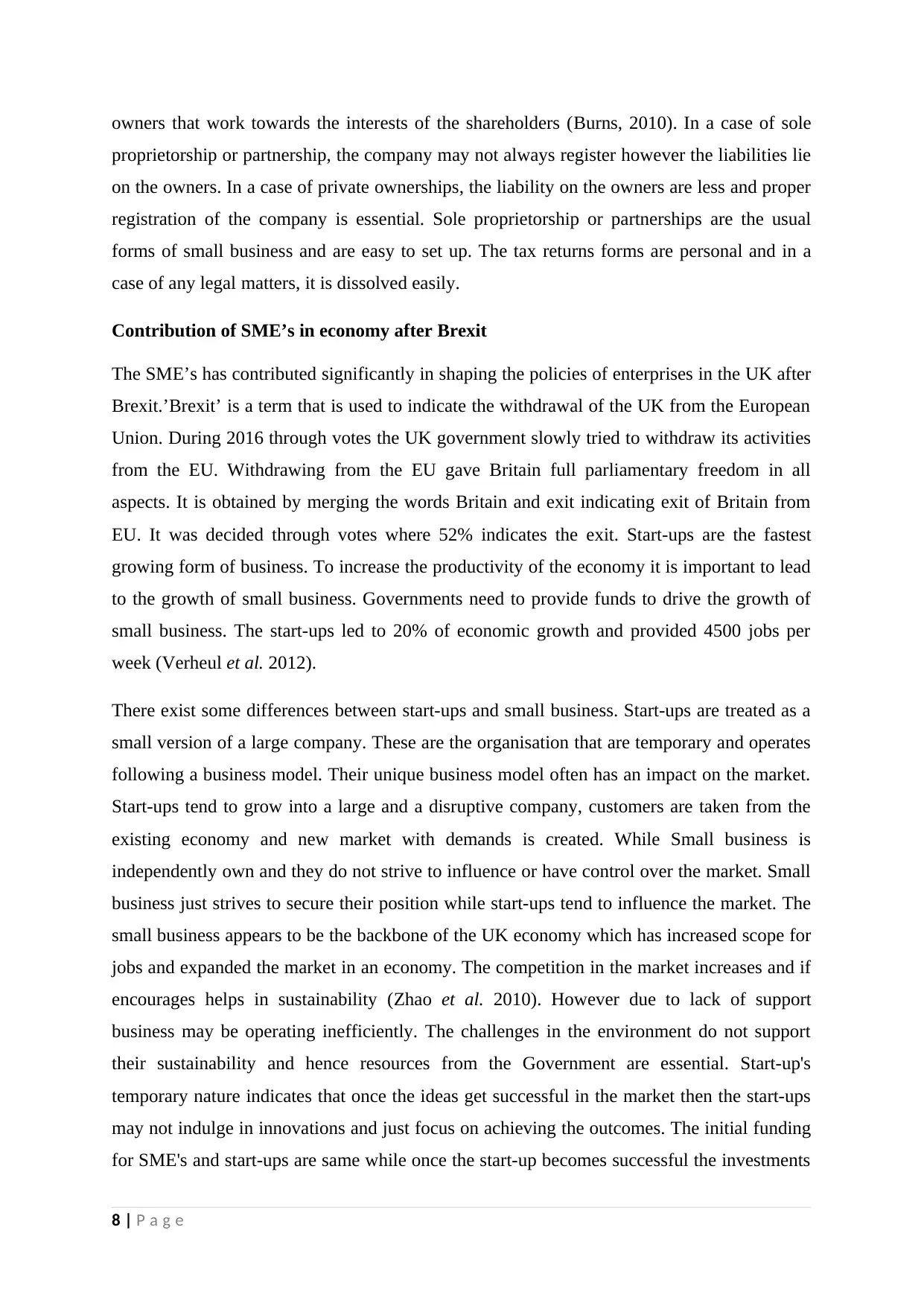
owners that work towards the interests of the shareholders (Burns, 2010). In a case of sole
proprietorship or partnership, the company may not always register however the liabilities lie
on the owners. In a case of private ownerships, the liability on the owners are less and proper
registration of the company is essential. Sole proprietorship or partnerships are the usual
forms of small business and are easy to set up. The tax returns forms are personal and in a
case of any legal matters, it is dissolved easily.
Contribution of SME’s in economy after Brexit
The SME’s has contributed significantly in shaping the policies of enterprises in the UK after
Brexit.’Brexit’ is a term that is used to indicate the withdrawal of the UK from the European
Union. During 2016 through votes the UK government slowly tried to withdraw its activities
from the EU. Withdrawing from the EU gave Britain full parliamentary freedom in all
aspects. It is obtained by merging the words Britain and exit indicating exit of Britain from
EU. It was decided through votes where 52% indicates the exit. Start-ups are the fastest
growing form of business. To increase the productivity of the economy it is important to lead
to the growth of small business. Governments need to provide funds to drive the growth of
small business. The start-ups led to 20% of economic growth and provided 4500 jobs per
week (Verheul et al. 2012).
There exist some differences between start-ups and small business. Start-ups are treated as a
small version of a large company. These are the organisation that are temporary and operates
following a business model. Their unique business model often has an impact on the market.
Start-ups tend to grow into a large and a disruptive company, customers are taken from the
existing economy and new market with demands is created. While Small business is
independently own and they do not strive to influence or have control over the market. Small
business just strives to secure their position while start-ups tend to influence the market. The
small business appears to be the backbone of the UK economy which has increased scope for
jobs and expanded the market in an economy. The competition in the market increases and if
encourages helps in sustainability (Zhao et al. 2010). However due to lack of support
business may be operating inefficiently. The challenges in the environment do not support
their sustainability and hence resources from the Government are essential. Start-up's
temporary nature indicates that once the ideas get successful in the market then the start-ups
may not indulge in innovations and just focus on achieving the outcomes. The initial funding
for SME's and start-ups are same while once the start-up becomes successful the investments
8 | P a g e
proprietorship or partnership, the company may not always register however the liabilities lie
on the owners. In a case of private ownerships, the liability on the owners are less and proper
registration of the company is essential. Sole proprietorship or partnerships are the usual
forms of small business and are easy to set up. The tax returns forms are personal and in a
case of any legal matters, it is dissolved easily.
Contribution of SME’s in economy after Brexit
The SME’s has contributed significantly in shaping the policies of enterprises in the UK after
Brexit.’Brexit’ is a term that is used to indicate the withdrawal of the UK from the European
Union. During 2016 through votes the UK government slowly tried to withdraw its activities
from the EU. Withdrawing from the EU gave Britain full parliamentary freedom in all
aspects. It is obtained by merging the words Britain and exit indicating exit of Britain from
EU. It was decided through votes where 52% indicates the exit. Start-ups are the fastest
growing form of business. To increase the productivity of the economy it is important to lead
to the growth of small business. Governments need to provide funds to drive the growth of
small business. The start-ups led to 20% of economic growth and provided 4500 jobs per
week (Verheul et al. 2012).
There exist some differences between start-ups and small business. Start-ups are treated as a
small version of a large company. These are the organisation that are temporary and operates
following a business model. Their unique business model often has an impact on the market.
Start-ups tend to grow into a large and a disruptive company, customers are taken from the
existing economy and new market with demands is created. While Small business is
independently own and they do not strive to influence or have control over the market. Small
business just strives to secure their position while start-ups tend to influence the market. The
small business appears to be the backbone of the UK economy which has increased scope for
jobs and expanded the market in an economy. The competition in the market increases and if
encourages helps in sustainability (Zhao et al. 2010). However due to lack of support
business may be operating inefficiently. The challenges in the environment do not support
their sustainability and hence resources from the Government are essential. Start-up's
temporary nature indicates that once the ideas get successful in the market then the start-ups
may not indulge in innovations and just focus on achieving the outcomes. The initial funding
for SME's and start-ups are same while once the start-up becomes successful the investments
8 | P a g e
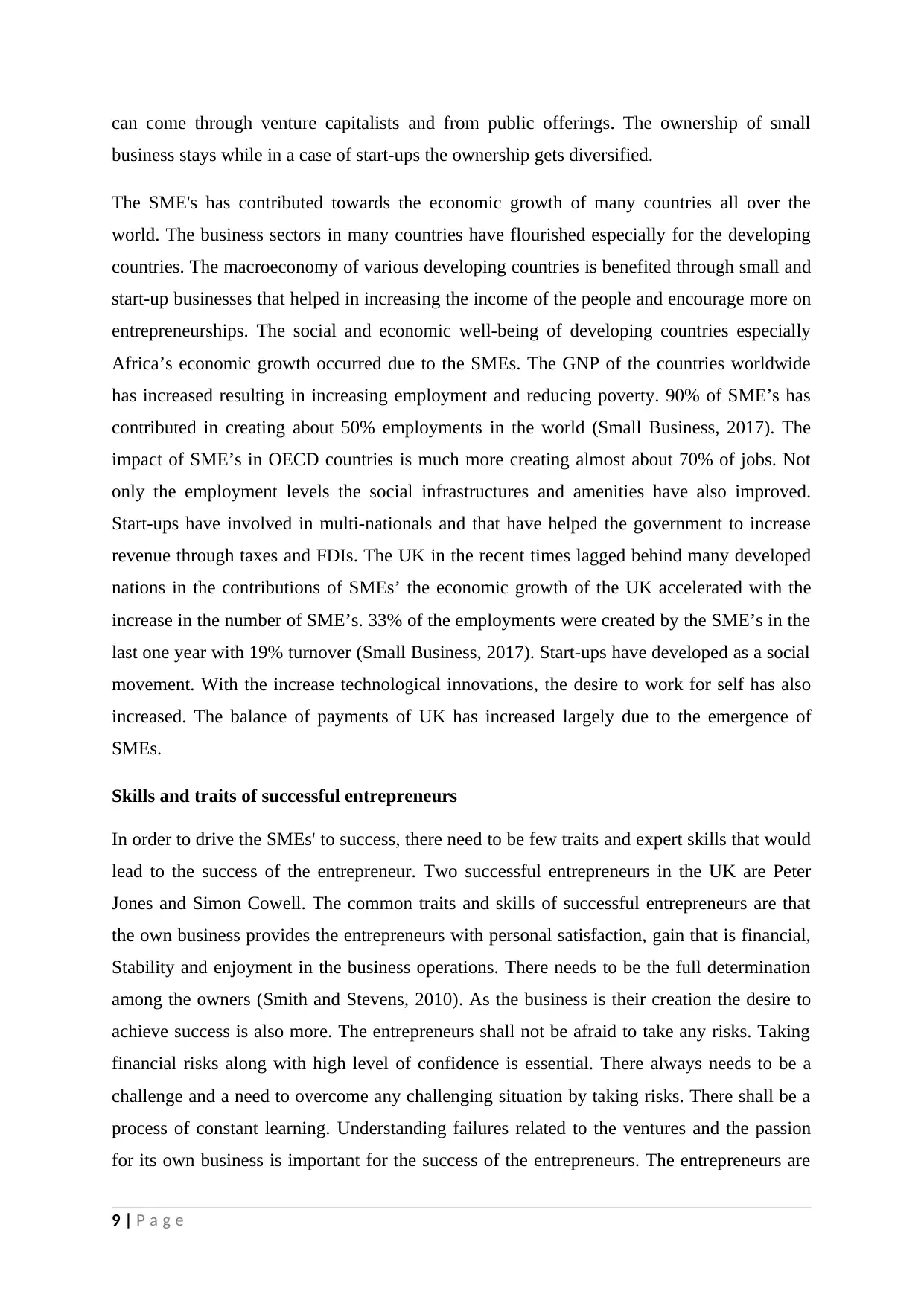
can come through venture capitalists and from public offerings. The ownership of small
business stays while in a case of start-ups the ownership gets diversified.
The SME's has contributed towards the economic growth of many countries all over the
world. The business sectors in many countries have flourished especially for the developing
countries. The macroeconomy of various developing countries is benefited through small and
start-up businesses that helped in increasing the income of the people and encourage more on
entrepreneurships. The social and economic well-being of developing countries especially
Africa’s economic growth occurred due to the SMEs. The GNP of the countries worldwide
has increased resulting in increasing employment and reducing poverty. 90% of SME’s has
contributed in creating about 50% employments in the world (Small Business, 2017). The
impact of SME’s in OECD countries is much more creating almost about 70% of jobs. Not
only the employment levels the social infrastructures and amenities have also improved.
Start-ups have involved in multi-nationals and that have helped the government to increase
revenue through taxes and FDIs. The UK in the recent times lagged behind many developed
nations in the contributions of SMEs’ the economic growth of the UK accelerated with the
increase in the number of SME’s. 33% of the employments were created by the SME’s in the
last one year with 19% turnover (Small Business, 2017). Start-ups have developed as a social
movement. With the increase technological innovations, the desire to work for self has also
increased. The balance of payments of UK has increased largely due to the emergence of
SMEs.
Skills and traits of successful entrepreneurs
In order to drive the SMEs' to success, there need to be few traits and expert skills that would
lead to the success of the entrepreneur. Two successful entrepreneurs in the UK are Peter
Jones and Simon Cowell. The common traits and skills of successful entrepreneurs are that
the own business provides the entrepreneurs with personal satisfaction, gain that is financial,
Stability and enjoyment in the business operations. There needs to be the full determination
among the owners (Smith and Stevens, 2010). As the business is their creation the desire to
achieve success is also more. The entrepreneurs shall not be afraid to take any risks. Taking
financial risks along with high level of confidence is essential. There always needs to be a
challenge and a need to overcome any challenging situation by taking risks. There shall be a
process of constant learning. Understanding failures related to the ventures and the passion
for its own business is important for the success of the entrepreneurs. The entrepreneurs are
9 | P a g e
business stays while in a case of start-ups the ownership gets diversified.
The SME's has contributed towards the economic growth of many countries all over the
world. The business sectors in many countries have flourished especially for the developing
countries. The macroeconomy of various developing countries is benefited through small and
start-up businesses that helped in increasing the income of the people and encourage more on
entrepreneurships. The social and economic well-being of developing countries especially
Africa’s economic growth occurred due to the SMEs. The GNP of the countries worldwide
has increased resulting in increasing employment and reducing poverty. 90% of SME’s has
contributed in creating about 50% employments in the world (Small Business, 2017). The
impact of SME’s in OECD countries is much more creating almost about 70% of jobs. Not
only the employment levels the social infrastructures and amenities have also improved.
Start-ups have involved in multi-nationals and that have helped the government to increase
revenue through taxes and FDIs. The UK in the recent times lagged behind many developed
nations in the contributions of SMEs’ the economic growth of the UK accelerated with the
increase in the number of SME’s. 33% of the employments were created by the SME’s in the
last one year with 19% turnover (Small Business, 2017). Start-ups have developed as a social
movement. With the increase technological innovations, the desire to work for self has also
increased. The balance of payments of UK has increased largely due to the emergence of
SMEs.
Skills and traits of successful entrepreneurs
In order to drive the SMEs' to success, there need to be few traits and expert skills that would
lead to the success of the entrepreneur. Two successful entrepreneurs in the UK are Peter
Jones and Simon Cowell. The common traits and skills of successful entrepreneurs are that
the own business provides the entrepreneurs with personal satisfaction, gain that is financial,
Stability and enjoyment in the business operations. There needs to be the full determination
among the owners (Smith and Stevens, 2010). As the business is their creation the desire to
achieve success is also more. The entrepreneurs shall not be afraid to take any risks. Taking
financial risks along with high level of confidence is essential. There always needs to be a
challenge and a need to overcome any challenging situation by taking risks. There shall be a
process of constant learning. Understanding failures related to the ventures and the passion
for its own business is important for the success of the entrepreneurs. The entrepreneurs are
9 | P a g e
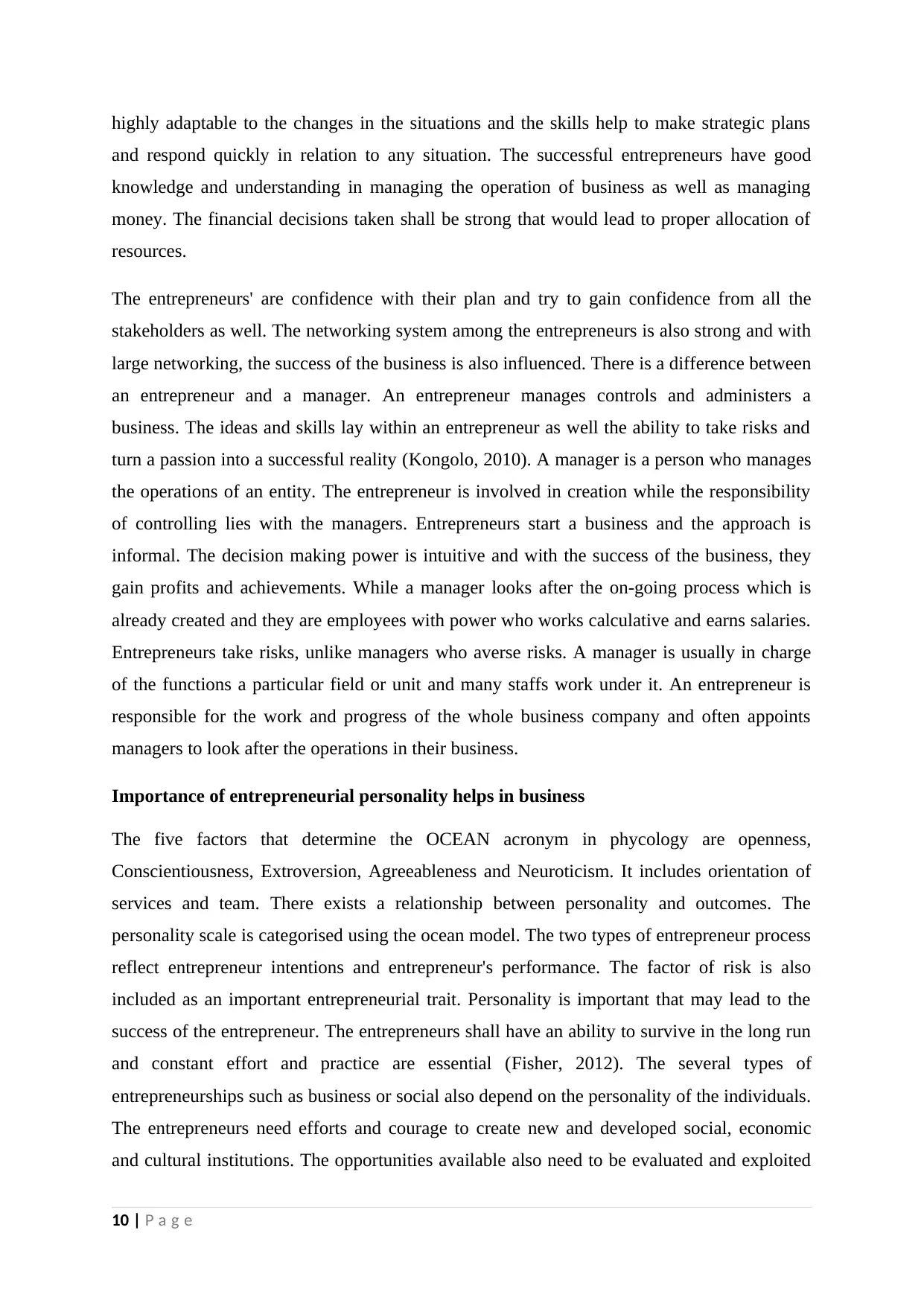
highly adaptable to the changes in the situations and the skills help to make strategic plans
and respond quickly in relation to any situation. The successful entrepreneurs have good
knowledge and understanding in managing the operation of business as well as managing
money. The financial decisions taken shall be strong that would lead to proper allocation of
resources.
The entrepreneurs' are confidence with their plan and try to gain confidence from all the
stakeholders as well. The networking system among the entrepreneurs is also strong and with
large networking, the success of the business is also influenced. There is a difference between
an entrepreneur and a manager. An entrepreneur manages controls and administers a
business. The ideas and skills lay within an entrepreneur as well the ability to take risks and
turn a passion into a successful reality (Kongolo, 2010). A manager is a person who manages
the operations of an entity. The entrepreneur is involved in creation while the responsibility
of controlling lies with the managers. Entrepreneurs start a business and the approach is
informal. The decision making power is intuitive and with the success of the business, they
gain profits and achievements. While a manager looks after the on-going process which is
already created and they are employees with power who works calculative and earns salaries.
Entrepreneurs take risks, unlike managers who averse risks. A manager is usually in charge
of the functions a particular field or unit and many staffs work under it. An entrepreneur is
responsible for the work and progress of the whole business company and often appoints
managers to look after the operations in their business.
Importance of entrepreneurial personality helps in business
The five factors that determine the OCEAN acronym in phycology are openness,
Conscientiousness, Extroversion, Agreeableness and Neuroticism. It includes orientation of
services and team. There exists a relationship between personality and outcomes. The
personality scale is categorised using the ocean model. The two types of entrepreneur process
reflect entrepreneur intentions and entrepreneur's performance. The factor of risk is also
included as an important entrepreneurial trait. Personality is important that may lead to the
success of the entrepreneur. The entrepreneurs shall have an ability to survive in the long run
and constant effort and practice are essential (Fisher, 2012). The several types of
entrepreneurships such as business or social also depend on the personality of the individuals.
The entrepreneurs need efforts and courage to create new and developed social, economic
and cultural institutions. The opportunities available also need to be evaluated and exploited
10 | P a g e
and respond quickly in relation to any situation. The successful entrepreneurs have good
knowledge and understanding in managing the operation of business as well as managing
money. The financial decisions taken shall be strong that would lead to proper allocation of
resources.
The entrepreneurs' are confidence with their plan and try to gain confidence from all the
stakeholders as well. The networking system among the entrepreneurs is also strong and with
large networking, the success of the business is also influenced. There is a difference between
an entrepreneur and a manager. An entrepreneur manages controls and administers a
business. The ideas and skills lay within an entrepreneur as well the ability to take risks and
turn a passion into a successful reality (Kongolo, 2010). A manager is a person who manages
the operations of an entity. The entrepreneur is involved in creation while the responsibility
of controlling lies with the managers. Entrepreneurs start a business and the approach is
informal. The decision making power is intuitive and with the success of the business, they
gain profits and achievements. While a manager looks after the on-going process which is
already created and they are employees with power who works calculative and earns salaries.
Entrepreneurs take risks, unlike managers who averse risks. A manager is usually in charge
of the functions a particular field or unit and many staffs work under it. An entrepreneur is
responsible for the work and progress of the whole business company and often appoints
managers to look after the operations in their business.
Importance of entrepreneurial personality helps in business
The five factors that determine the OCEAN acronym in phycology are openness,
Conscientiousness, Extroversion, Agreeableness and Neuroticism. It includes orientation of
services and team. There exists a relationship between personality and outcomes. The
personality scale is categorised using the ocean model. The two types of entrepreneur process
reflect entrepreneur intentions and entrepreneur's performance. The factor of risk is also
included as an important entrepreneurial trait. Personality is important that may lead to the
success of the entrepreneur. The entrepreneurs shall have an ability to survive in the long run
and constant effort and practice are essential (Fisher, 2012). The several types of
entrepreneurships such as business or social also depend on the personality of the individuals.
The entrepreneurs need efforts and courage to create new and developed social, economic
and cultural institutions. The opportunities available also need to be evaluated and exploited
10 | P a g e
Secure Best Marks with AI Grader
Need help grading? Try our AI Grader for instant feedback on your assignments.
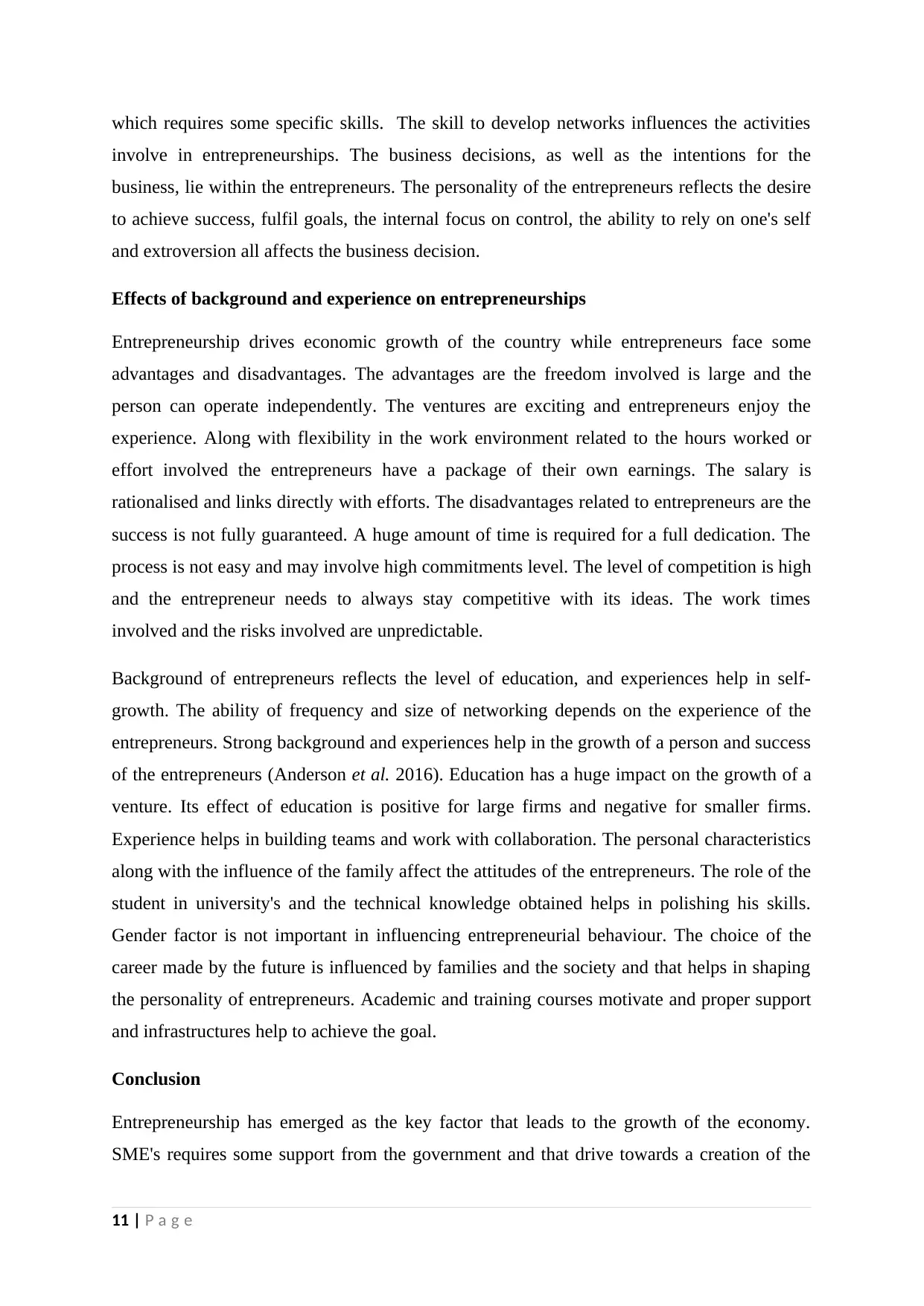
which requires some specific skills. The skill to develop networks influences the activities
involve in entrepreneurships. The business decisions, as well as the intentions for the
business, lie within the entrepreneurs. The personality of the entrepreneurs reflects the desire
to achieve success, fulfil goals, the internal focus on control, the ability to rely on one's self
and extroversion all affects the business decision.
Effects of background and experience on entrepreneurships
Entrepreneurship drives economic growth of the country while entrepreneurs face some
advantages and disadvantages. The advantages are the freedom involved is large and the
person can operate independently. The ventures are exciting and entrepreneurs enjoy the
experience. Along with flexibility in the work environment related to the hours worked or
effort involved the entrepreneurs have a package of their own earnings. The salary is
rationalised and links directly with efforts. The disadvantages related to entrepreneurs are the
success is not fully guaranteed. A huge amount of time is required for a full dedication. The
process is not easy and may involve high commitments level. The level of competition is high
and the entrepreneur needs to always stay competitive with its ideas. The work times
involved and the risks involved are unpredictable.
Background of entrepreneurs reflects the level of education, and experiences help in self-
growth. The ability of frequency and size of networking depends on the experience of the
entrepreneurs. Strong background and experiences help in the growth of a person and success
of the entrepreneurs (Anderson et al. 2016). Education has a huge impact on the growth of a
venture. Its effect of education is positive for large firms and negative for smaller firms.
Experience helps in building teams and work with collaboration. The personal characteristics
along with the influence of the family affect the attitudes of the entrepreneurs. The role of the
student in university's and the technical knowledge obtained helps in polishing his skills.
Gender factor is not important in influencing entrepreneurial behaviour. The choice of the
career made by the future is influenced by families and the society and that helps in shaping
the personality of entrepreneurs. Academic and training courses motivate and proper support
and infrastructures help to achieve the goal.
Conclusion
Entrepreneurship has emerged as the key factor that leads to the growth of the economy.
SME's requires some support from the government and that drive towards a creation of the
11 | P a g e
involve in entrepreneurships. The business decisions, as well as the intentions for the
business, lie within the entrepreneurs. The personality of the entrepreneurs reflects the desire
to achieve success, fulfil goals, the internal focus on control, the ability to rely on one's self
and extroversion all affects the business decision.
Effects of background and experience on entrepreneurships
Entrepreneurship drives economic growth of the country while entrepreneurs face some
advantages and disadvantages. The advantages are the freedom involved is large and the
person can operate independently. The ventures are exciting and entrepreneurs enjoy the
experience. Along with flexibility in the work environment related to the hours worked or
effort involved the entrepreneurs have a package of their own earnings. The salary is
rationalised and links directly with efforts. The disadvantages related to entrepreneurs are the
success is not fully guaranteed. A huge amount of time is required for a full dedication. The
process is not easy and may involve high commitments level. The level of competition is high
and the entrepreneur needs to always stay competitive with its ideas. The work times
involved and the risks involved are unpredictable.
Background of entrepreneurs reflects the level of education, and experiences help in self-
growth. The ability of frequency and size of networking depends on the experience of the
entrepreneurs. Strong background and experiences help in the growth of a person and success
of the entrepreneurs (Anderson et al. 2016). Education has a huge impact on the growth of a
venture. Its effect of education is positive for large firms and negative for smaller firms.
Experience helps in building teams and work with collaboration. The personal characteristics
along with the influence of the family affect the attitudes of the entrepreneurs. The role of the
student in university's and the technical knowledge obtained helps in polishing his skills.
Gender factor is not important in influencing entrepreneurial behaviour. The choice of the
career made by the future is influenced by families and the society and that helps in shaping
the personality of entrepreneurs. Academic and training courses motivate and proper support
and infrastructures help to achieve the goal.
Conclusion
Entrepreneurship has emerged as the key factor that leads to the growth of the economy.
SME's requires some support from the government and that drive towards a creation of the
11 | P a g e
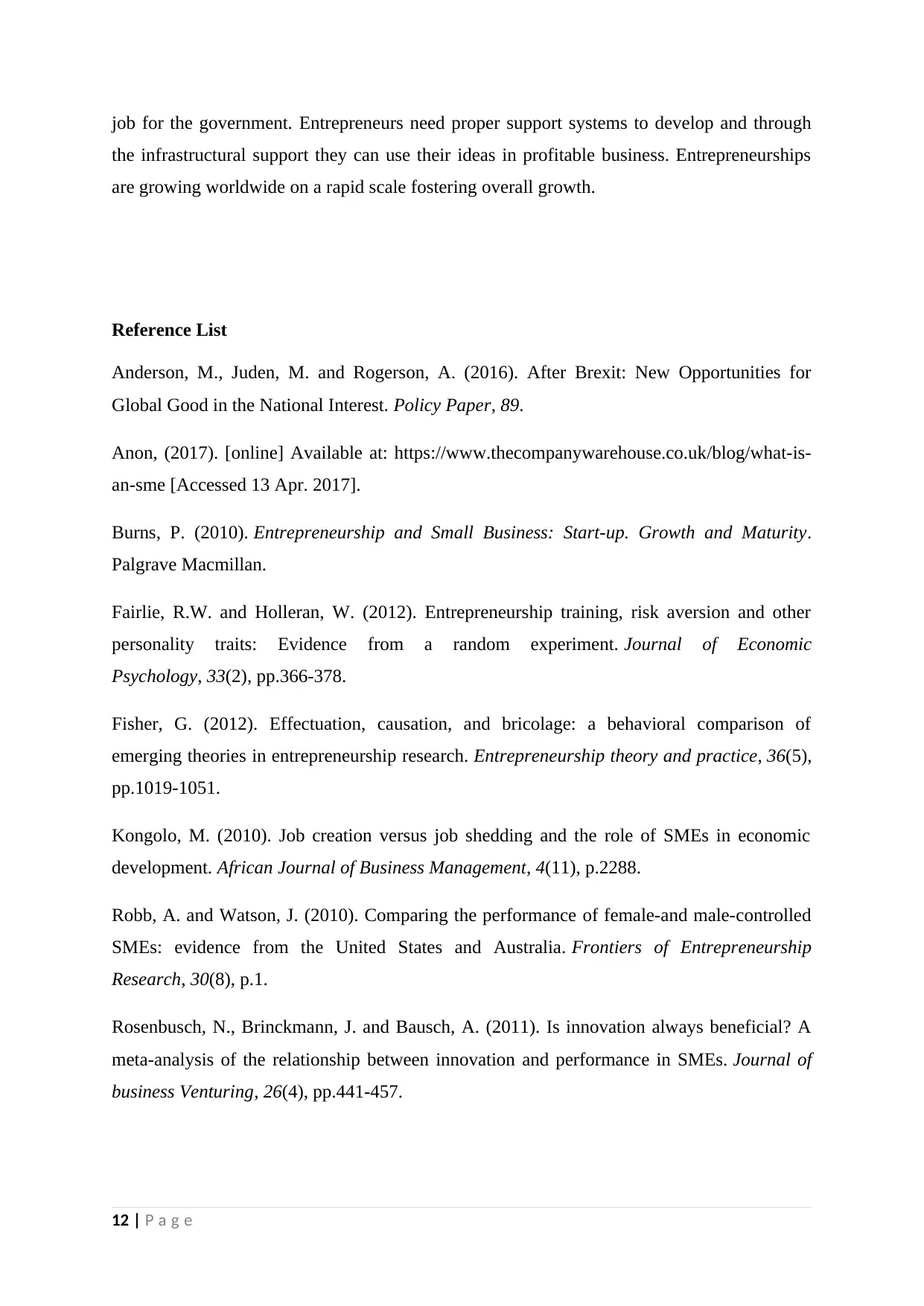
job for the government. Entrepreneurs need proper support systems to develop and through
the infrastructural support they can use their ideas in profitable business. Entrepreneurships
are growing worldwide on a rapid scale fostering overall growth.
Reference List
Anderson, M., Juden, M. and Rogerson, A. (2016). After Brexit: New Opportunities for
Global Good in the National Interest. Policy Paper, 89.
Anon, (2017). [online] Available at: https://www.thecompanywarehouse.co.uk/blog/what-is-
an-sme [Accessed 13 Apr. 2017].
Burns, P. (2010). Entrepreneurship and Small Business: Start-up. Growth and Maturity.
Palgrave Macmillan.
Fairlie, R.W. and Holleran, W. (2012). Entrepreneurship training, risk aversion and other
personality traits: Evidence from a random experiment. Journal of Economic
Psychology, 33(2), pp.366-378.
Fisher, G. (2012). Effectuation, causation, and bricolage: a behavioral comparison of
emerging theories in entrepreneurship research. Entrepreneurship theory and practice, 36(5),
pp.1019-1051.
Kongolo, M. (2010). Job creation versus job shedding and the role of SMEs in economic
development. African Journal of Business Management, 4(11), p.2288.
Robb, A. and Watson, J. (2010). Comparing the performance of female-and male-controlled
SMEs: evidence from the United States and Australia. Frontiers of Entrepreneurship
Research, 30(8), p.1.
Rosenbusch, N., Brinckmann, J. and Bausch, A. (2011). Is innovation always beneficial? A
meta-analysis of the relationship between innovation and performance in SMEs. Journal of
business Venturing, 26(4), pp.441-457.
12 | P a g e
the infrastructural support they can use their ideas in profitable business. Entrepreneurships
are growing worldwide on a rapid scale fostering overall growth.
Reference List
Anderson, M., Juden, M. and Rogerson, A. (2016). After Brexit: New Opportunities for
Global Good in the National Interest. Policy Paper, 89.
Anon, (2017). [online] Available at: https://www.thecompanywarehouse.co.uk/blog/what-is-
an-sme [Accessed 13 Apr. 2017].
Burns, P. (2010). Entrepreneurship and Small Business: Start-up. Growth and Maturity.
Palgrave Macmillan.
Fairlie, R.W. and Holleran, W. (2012). Entrepreneurship training, risk aversion and other
personality traits: Evidence from a random experiment. Journal of Economic
Psychology, 33(2), pp.366-378.
Fisher, G. (2012). Effectuation, causation, and bricolage: a behavioral comparison of
emerging theories in entrepreneurship research. Entrepreneurship theory and practice, 36(5),
pp.1019-1051.
Kongolo, M. (2010). Job creation versus job shedding and the role of SMEs in economic
development. African Journal of Business Management, 4(11), p.2288.
Robb, A. and Watson, J. (2010). Comparing the performance of female-and male-controlled
SMEs: evidence from the United States and Australia. Frontiers of Entrepreneurship
Research, 30(8), p.1.
Rosenbusch, N., Brinckmann, J. and Bausch, A. (2011). Is innovation always beneficial? A
meta-analysis of the relationship between innovation and performance in SMEs. Journal of
business Venturing, 26(4), pp.441-457.
12 | P a g e
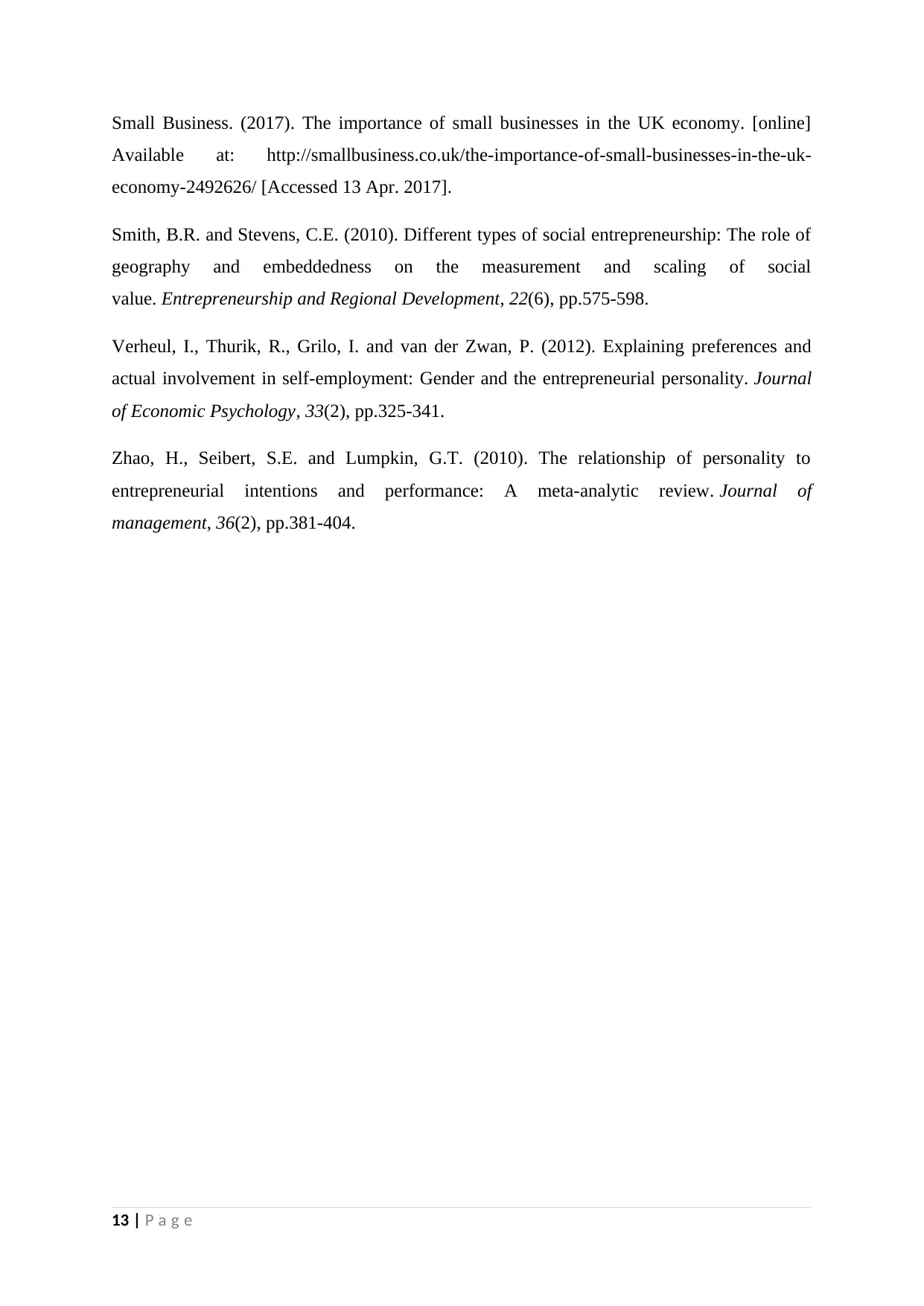
Small Business. (2017). The importance of small businesses in the UK economy. [online]
Available at: http://smallbusiness.co.uk/the-importance-of-small-businesses-in-the-uk-
economy-2492626/ [Accessed 13 Apr. 2017].
Smith, B.R. and Stevens, C.E. (2010). Different types of social entrepreneurship: The role of
geography and embeddedness on the measurement and scaling of social
value. Entrepreneurship and Regional Development, 22(6), pp.575-598.
Verheul, I., Thurik, R., Grilo, I. and van der Zwan, P. (2012). Explaining preferences and
actual involvement in self-employment: Gender and the entrepreneurial personality. Journal
of Economic Psychology, 33(2), pp.325-341.
Zhao, H., Seibert, S.E. and Lumpkin, G.T. (2010). The relationship of personality to
entrepreneurial intentions and performance: A meta-analytic review. Journal of
management, 36(2), pp.381-404.
13 | P a g e
Available at: http://smallbusiness.co.uk/the-importance-of-small-businesses-in-the-uk-
economy-2492626/ [Accessed 13 Apr. 2017].
Smith, B.R. and Stevens, C.E. (2010). Different types of social entrepreneurship: The role of
geography and embeddedness on the measurement and scaling of social
value. Entrepreneurship and Regional Development, 22(6), pp.575-598.
Verheul, I., Thurik, R., Grilo, I. and van der Zwan, P. (2012). Explaining preferences and
actual involvement in self-employment: Gender and the entrepreneurial personality. Journal
of Economic Psychology, 33(2), pp.325-341.
Zhao, H., Seibert, S.E. and Lumpkin, G.T. (2010). The relationship of personality to
entrepreneurial intentions and performance: A meta-analytic review. Journal of
management, 36(2), pp.381-404.
13 | P a g e
1 out of 13
Related Documents
Your All-in-One AI-Powered Toolkit for Academic Success.
+13062052269
info@desklib.com
Available 24*7 on WhatsApp / Email
![[object Object]](/_next/static/media/star-bottom.7253800d.svg)
Unlock your academic potential
© 2024 | Zucol Services PVT LTD | All rights reserved.





